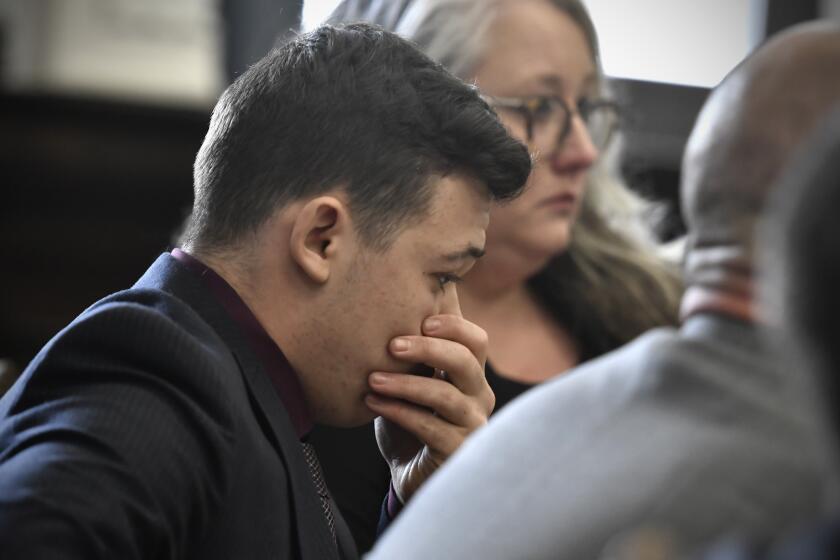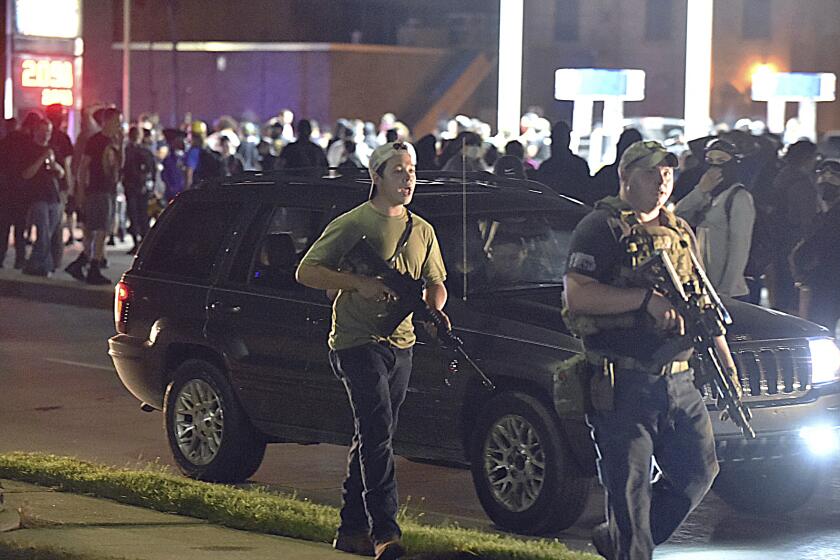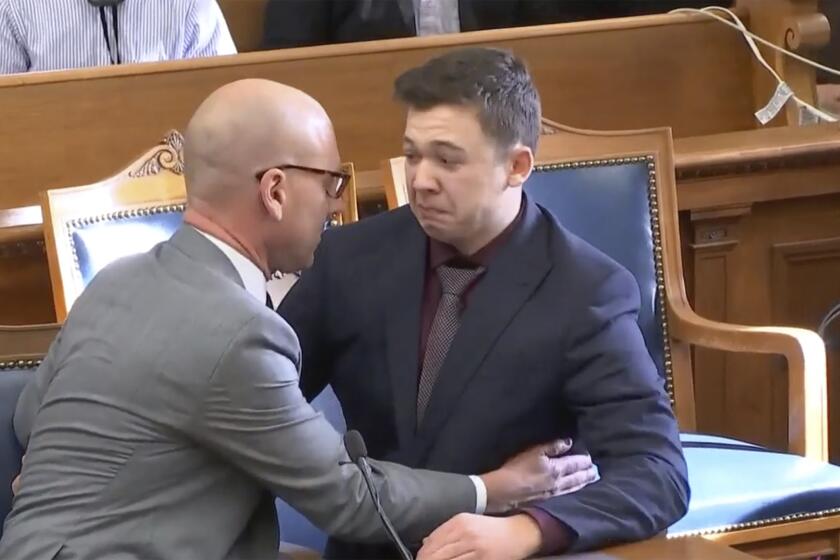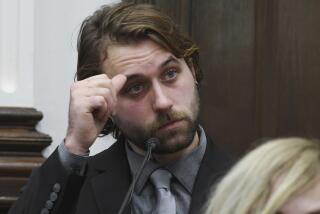After Kyle Rittenhouse trial, a city and country wonder ‘where we go from here’
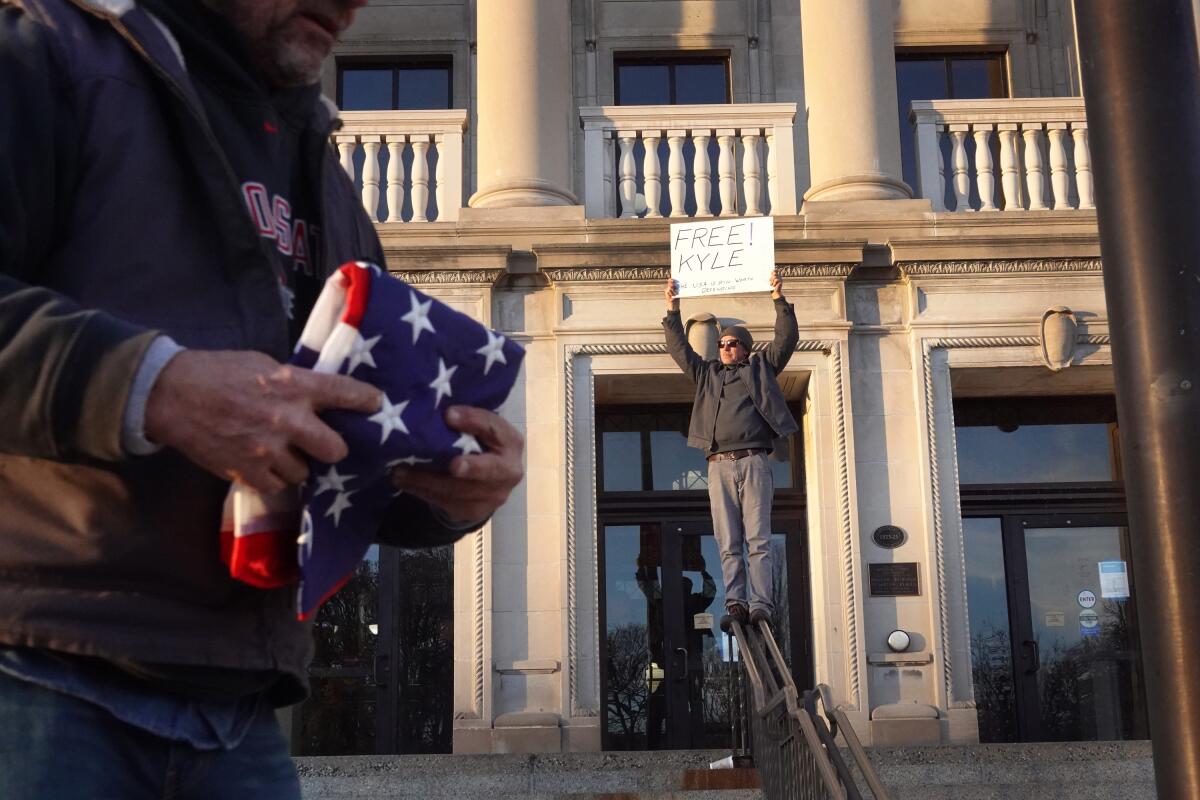
KENOSHA, Wis. — The deadly rifle fire pierced the air just a block from Linda Tolliver’s used tire shop, and nearly 15 months later the teenage gunman, Kyle Rittenhouse, went on trial in a courthouse only four blocks away.
Since the fatal shootings of Joseph Rosenbaum and Anthony Huber and the wounding of Gaige Grosskreutz, there has been a national spotlight on this small city along the shore of Lake Michigan that Tolliver calls home.
“I’m exhausted,” she said from inside a frigid garage lined with car jacks and stacks of tires. “Where we go from here, no one knows.”
On Saturday, a day after Rittenhouse was acquitted of all charges in the August 2020 shootings during a protest against police brutality after a Black man was shot, an eerie calm blanketed the city.
Outside the Kenosha County Courthouse, a man paced back and forth carrying an American flag. Television news trucks were packing up. And nearby, city workers assembled a makeshift ice rink for holiday frivolity.
Still, Wisconsin Gov. Tony Evers kept 500 National Guard troops on call.
The only person who appears allowed to go on and live a full life is Kyle Rittenhouse, the 18-year-old who killed two people.
It took the overwhelmingly white jury — seven women and five men — 3½ days to reach its decision inside the downtown courthouse, a capstone to a two-week trial that has amplified bitter national debate over guns, vigilantism and law and order.
A handful of demonstrations took place Friday night and early Saturday in cities including New York, Chicago and Portland, Ore., against what protesters see as a failure of the criminal justice system. In Los Angeles, about 20 people gathered Saturday at Pan Pacific Park, marching peacefully along sidewalks and through the bustling Grove shopping center carrying signs reading “Kyle Rittenhouse and the Whole Damn System Is Guilty” and urging shoppers to join them.
As Rittenhouse, 18, was driven out of Kenosha in an SUV following the verdicts, a documentary film crew with Fox News rode alongside.
“The jury reached the correct verdict. Self-defense is not illegal,” Rittenhouse said in footage released Saturday. “And I believe they came to the correct verdict, and I’m glad that everything went well.”
Decades before it became the backdrop of the police shooting of Jacob Blake and, in subsequent days, of burning buildings and of Rittenhouse firing his AR-15-style rifle, Kenosha was perhaps best known for having assembled Hornets and Gremlins for the now-defunct American Motors Corp. The current attention, residents say, may cause a permanent scarlet letter for the Rust Belt city of 100,000 people.
“The violence, the death, that’s the first thing Americans think of when someone mentions this city,” said Kevin Ervin, who co-owns Franks Diner downtown. Between serving up heaps of his special known as the “garbage plate” — hash browns, eggs, green peppers, onions, bacon — he paused to reflect on the events of the last year.
Will the Kyle Rittenhouse verdict send the wrong message?
In the days after Rusten Sheskey, a white Kenosha police officer, shot and paralyzed Blake, protesters marched up and down the street outside Ervin’s restaurant.
Federal law enforcement and National Guard troops were dispatched across the city for several weeks to protect property. But many small businesses were destroyed or damaged in the unrest.
“It quickly escalated,” Ervin said, recalling the moment he saw flames. A restaurant down the block began to burn.
“I feared for my business,” he said. “We thought the whole city might burn.”
Rittenhouse, a resident of Antioch, Ill., had been visiting friends and family in Kenosha. He arrived at the protests carrying a firearm and shot the three white men, saying later in court that he had acted in self-defense.
Ervin followed the trial closely, and a single thought played repeatedly through his mind: “Why would a kid arrive at this moment of chaos with a gun?”
“It made no sense,” he said, adding that he thought justice was not served. “There has to be some accountability.”
Twenty miles southwest of Kenosha, past dried corn fields, Rachel Hird, who owns an antiques store in Antioch, stood inside on a quiet Saturday morning as a few patrons wandered past. Hird said she didn’t watch much of the trial.
“From what I know, it seems he was defending himself,” she said. “But it’s disturbing to see kids carrying guns in the street.”
Athletes, including Colin Kaepernick, Bubba Wallace and Ja Morant, react to Kyle Rittenhouse being acquitted on all charges Friday in Kenosha, Wis.
Video presented during the trial showed Rosenbaum chasing Rittenhouse through a parking lot before Rittenhouse shot him.
The second man Rittenhouse killed, Huber, could be seen swinging a skateboard at Rittenhouse’s head before attempting to grab his rifle in the middle of a street where hundreds of protesters gathered.
Near the end of the trial, Rittenhouse took the stand and testified that he had showed up to protect property and to offer medical aid to anybody who needed it.
“I didn’t do anything wrong,” Rittenhouse said. “I defended myself.”
On that night, 25-year-old Emily Orr was protesting for racial justice and an end to police brutality. She’s a mental health therapist and part-time bartender who is a native of Kenosha. Orr has lived here her entire life except for a few years when she attended graduate school in Milwaukee. She said she was being hit by police tear gas as Rittenhouse fired the fatal rounds into Rosenbaum and Huber.
“There is no question justice wasn’t served,” she said Saturday from behind a marble bar in downtown Kenosha. Because of that opinion, she said, she has lost several friends over the last year.
“People show their true colors, their true racism, when talking about Blake or the protests,” said Orr, who is white. “This is sad because it’s my community.”
When businesses here began to burn, she felt torn. But she thought about the words of the Rev. Martin Luther King Jr.: “A riot is the language of the unheard.”
“People have been unheard for a long time,” she said.
Kyle Rittenhouse’s not-guilty verdict sparked a variety of reactions from celebs such as Ava DuVernay, George Takei, Bette Midler, LeVar Burton and others.
Forty miles north, in Milwaukee, retired police Capt. Eric Moore has also seen the destruction left from protests.
In 2014, a Milwaukee officer killed an unarmed Black man and was never charged with a crime. And in 2016, unrest flooded the city when an officer killed a Black man fleeing a traffic stop and holding a gun.
When he looked to the south at what was happening in Kenosha, Moore said, “The whole community was traumatized by all of the strife that was going on.”
“This whole situation,” he said, “seems to be another step in a seemingly inexorable slide toward widespread mayhem in our country. It’s quite sad.”
Back in Kenosha, Tolliver, 60, stood in the garage of her shop, Ed’s Used Tires. It’s the same shop her father started in 1961. A day before Rittenhouse shot the three men, demonstrators had smashed windows at the shop. She viewed protesters heading toward her business on a Facebook Live stream and she jumped in her Toyota Celica and raced over. She doesn’t carry a gun, she said, but she slept inside her building that night to deter people from vandalizing it. In total, she said, the shop had $30,000 in damages.
“I’m just lucky I didn’t lose it all,” she said.
Tolliver said when she thinks about the deaths, she thinks of Rittenhouse being “young and dumb.”
“This is going to be with him the rest of his life,” she said.
On the day of the verdicts, several businesses in the area closed early. Some boarded up windows. Tolliver allowed her mechanics to go home because she wanted to be sure they were safe.
To her relief, nothing much happened after the verdicts were read Friday. The small number of protesters downtown at the courthouse were peaceful.
“We just want to work and earn a living,” she reflected. “And do it in peace.”
Times staff writers Jaweed Kaleem and Christian Martinez in Los Angeles contributed to this report.
More to Read
Sign up for Essential California
The most important California stories and recommendations in your inbox every morning.
You may occasionally receive promotional content from the Los Angeles Times.
